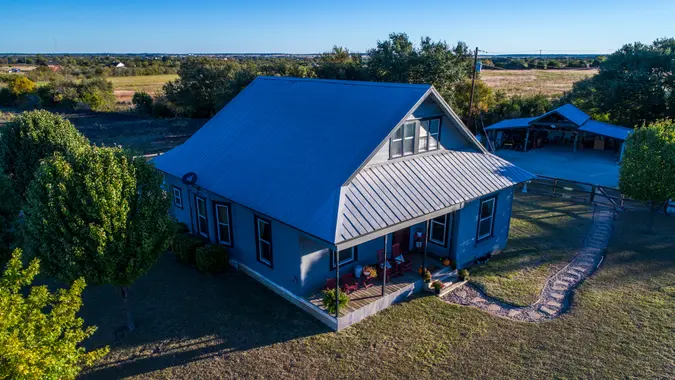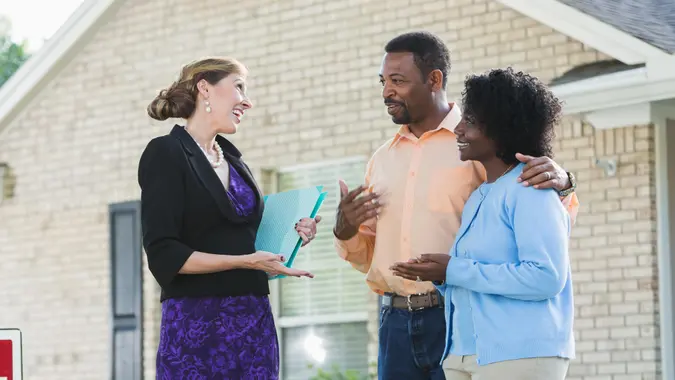HOA Fees: What To Know Before Buying a Home

Commitment to Our Readers
GOBankingRates' editorial team is committed to bringing you unbiased reviews and information. We use data-driven methodologies to evaluate financial products and services - our reviews and ratings are not influenced by advertisers. You can read more about our editorial guidelines and our products and services review methodology.

20 Years
Helping You Live Richer

Reviewed
by Experts

Trusted by
Millions of Readers
If you buy a home, condo or other property in a community with a homeowners association, you automatically become a member of an HOA when you purchase property in the community it oversees. An HOA, or homeowners association, is a type of community association made up of all of the homeowners in a particular community. HOAs, in a general sense, are responsible for preserving the nature of the community and protecting owners’ property values, according to the Community Associations Institute. While membership has benefits, such as the ability to vote for the association’s board of directors, it also requires that you pay a fee. Here’s what you’ll need to know about how HOA fees work, what they fund, and how much you should expect to pay.
See: 3 Things You Must Do When Your Savings Reach $50,000
What Are HOA Fees?
Definition of HOA Fees
HOA fees are an entirely different homeowner expense that is separate from your mortgage payment. It can be billed monthly, quarterly, or annually, and the money goes towards the common good in your community. Each HOA has its own bylaws and operating procedures that dictate how the money is to be used. They may also delineate specific things the money cannot be used for. Before you purchase a property in a community with an HOA, it’s important to understand what fees you’ll pay and what they’ll cover.
Types of Properties with HOA Fees
The most common types of properties with HOAs are condominium complexes, townhomes, and single-family homes in planned communities. Some high-rise buildings may also have HOAs.
What Do HOA Fees Cover?
Common Areas Maintenance
If you’re part of a homeowners association, you’re part of a community that shares some common spaces. Those areas are maintained using the combined funds of the community as a whole. Here are some of the typical common areas covered by HOA fees:
- Landscaping
- Swimming pools
- Clubhouses
- BBQ areas
- Lobbies
- Hallways
- Elevators
- Insurance
- Administrative expenses
Services Provided
In addition to the upkeep of communal areas, HOA fees fund certain specific services or costs. Common examples include the following:
- Trash removal
- Security
- Pest control
- Snow removal
- Insurance
- Administrative expenses
Reserve Funds
HOA fees also fund a reserve account the association can tap into for large, unexpected expenses or occasional but major maintenance and repairs. Healthy reserves prevent HOAs from having to impose special assessments on members. Special assessments are one-time fees that are separate from regular HOA fees. Depending on what they’re for, they can cost each owner thousands of dollars.
Average HOA Fees
National Averages
HOA fees are set according to the financial needs of the community, so they vary widely from one to the next. According to the National Association of Realtors, the average monthly HOA fee is $259. However, these fees can vary wildly from place to place. In New York, for example, the average HOA is $653. That makes New York the most expensive location for HOAs.
HOA fees can change from one year to the next, and they don’t necessarily tell you much about how well-managed a community is. For that, you’ll need to review the budgets from the last few years to see how money is being spent.
Factors Influencing Costs
A number of factors can affect how much you might pay for an HOA fee.
- Location: More expensive areas and properties tend to have higher HOA fees as well.
- Amenities offered: The nicer a community complex, the more it will cost to maintain it. Communities with lots of features tend to charge higher HOA fees.
- Community size: The amount of money needed to fund an HOA is divided equally among all of its members. Those with larger communities tend to pay less on a per-person basis, as the cost is spread out over a larger number of members.
What Happens If You Don’t Pay HOA Fees?
Potential Consequences
An HOA is a legally agreed-upon fee that all community members must pay. In the event that someone does not pay their HOA fee, the HOA board is authorized to impose certain fees and penalties, in addition to potentially taking legal action. Here are some of the potential consequences of not paying an HOA fee:
- Late fees: Most HOAs charge a nominal fee for not making a payment on time. This fee may be a small dollar amount or a percentage of the regular fee.
- Legal action: If a community member is seriously delinquent, an HOA board may take legal action, such as putting a lien on the property.
- Possible foreclosure: If a lien isn’t enough to motivate a community member to pay their HOA dues, the threat of foreclosure may be.
How To Find Out About HOA Fees Before Buying
Reviewing Governing Documents
HOAs have legal documents known as covenants, conditions, and restrictions that provide all the essential information about an HOA. Commonly known as CC&Rs, these documents dictate how an HOA is required to operate. They must be legally provided to new members of the HOA.
Asking Current Residents
Although CC&Rs provide all the legalese regarding an HOA, you may be able to get a more accessible picture of how they actually operate by talking with actual residents. They can tell you how the HOA operates in actuality, how its money is spent, and what the conditions are for fees being raised.
Tips for Managing HOA Fees
Budgeting for Monthly Expenses
As an HOA fee is essentially unavoidable if you buy into a community, you must include those fees in your overall housing budget. If a community has a very high HOA, it may turn a property from a dream option into one that is actually unaffordable for you. When making your budget, be sure to factor in how those HOA fees will rise over time.
Participating in HOA Meetings
HOAs are required to have regular meetings to field questions and keep members informed about their intentions and actions. The HOA board is also legally required to provide financial information to all members. If you want to stay informed about financial decisions, make suggestions for improvements or even join the board yourself, you should plan on attending all HOA meetings.
Our in-house research team and on-site financial experts work together to create content that’s accurate, impartial, and up to date. We fact-check every single statistic, quote and fact using trusted primary resources to make sure the information we provide is correct. You can learn more about GOBankingRates’ processes and standards in our editorial policy.
- Freddie Mac. 2022. "What Are HOAs?"
- Associa. "Understanding The Developer-Controlled Community."
- Community Associations Institute. "First-Time Homebuyers Guide to HOAs."
- Census Bureau. "2021 National — Housing Costs — All Occupied Units."
- Rocket Mortgage. 2023. "Debt-To-Income Ratio (DTI): What Is It And How Is It Calculated?"
- Nolo. "What's the Difference Between Homeowners' Association (HOA) Bylaws and CC&Rs?"
- Nolo. "Before Buying: How to Read the CC&Rs or Homeowners' Association (HOA) Documents."
 Written by
Written by  Edited by
Edited by 

























